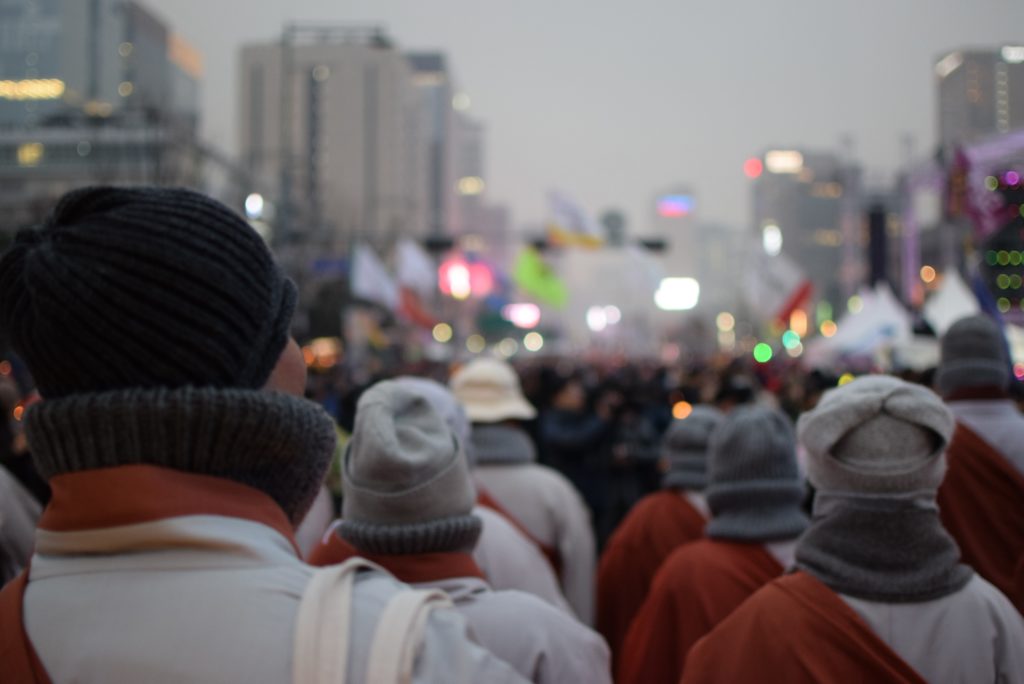The Peninsula
2022 in Review: Is Korea Becoming More Polarized?

This is the eight piece in a series looking at how the issues identified in KEI’s annual “10 Issues to Watch for on the Korean Peninsula” series and other issues of note developed in 2022. The original “10 Issues” piece can be found here.
Partisan shifts in Korea can give rise to subtle—and not-so-subtle—differences in Seoul’s approach to the alliance. Yet beyond the shift from a center-left to center-right government in 2022, are there longer-term trends in Korean public opinion that could affect bilateral relations? Did the contentious, knife-edge election of this year signal that Korea is becoming more polarized and if so to what effect?
In a paper we survey nearly two decades of evidence on this question. The received wisdom can be stated simply: despite the Sturm und Drang of demonstrations and protest—from debates over beef imports to the Park impeachment—Korean voters are generally centrist. Asked to position themselves on a left-right scale, most Korean voters crowd the middle. Differences with respect to standard left-right cleavages, for example over taxing the wealthy, redistribution or social policy, are surprisingly muted.
Regional differences and foreign policy play a somewhat larger role in dividing voters for the two dominant parties, but even there polling data does not suggest wide gulfs among the electorate. According to a May 2022 ASAN Institute report, South Koreans’ overall support for the alliance, the USFK, and trust in the U.S. security guarantee was high. A large majority of not only conservatives but also moderates and liberals expressed support for joining the QUAD and ROK-U.S.-Japan trilateral cooperation.
Yet there is some evidence of growing polarization as well. First, among partisan voters, ideological differences between those on the left and right have in fact been widening, and we are even seeing evidence of so-called “affective polarization”: dislike and distrust of political opponents and even the belief that they are nefarious and even disloyal. More interestingly, we are seeing a gradual widening of differences on important substantive issues as well. Questions about foreign policy are typically posed in terms of support for the alliance and willingness to engage North Korea. The ASAN Institute report, conducted in March 2022 during the election period, showed conservatives and liberals were sharply divided when asked about South Korea’s deployment of additional batteries for the Terminal High Altitude Area Defense (THAAD), the U.S.-led ballistic missile defense (BMD) system (though to a lesser degree), and the expansion of joint military exercises. Standard left right issues such as redistribution and questions about gender and sexual orientation also show widening partisan differences.
It is hard to know whether these differences will necessarily affect alliance relations; continuing evidence that Korea is positioned in a dangerous neighborhood have no doubt propelled the rise in positive views of the alliance even if polarization on the issue is increasing marginally. And despite some conservative critics who believe that Korean democracy is at risk, we see little evidence that polarization could lead to the type of open backsliding visible in Thailand or the Philippines. But we should never forget that our allies have their own political demons to contend with, and that all politics is local: domestic issues will continue to loom large on both alliance partners.
Stephan Haggard is a member of the board of the Korea Economic Institute and the Lawrence and Sallye Krause Professor of Korea-Pacific Studies, Director of the Korea-Pacific Program and distinguished professor of political science at the School of Global Policy and Strategy University of California San Diego. Yeilim Cheong is a PhD student in the Political Science department at UC San Diego. She received her B.A. in Political Science and Economics (double major) and M.A. in Political Science from Korea University. The views expressed here are the authors’ alone.
Photo from Shutterstock.
